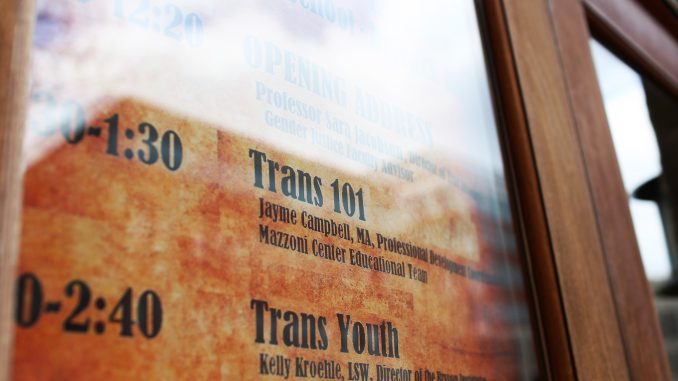
On Friday afternoon, the Beasley School of Law hosted “Transforming Law: Legal Issues in the Transgender Community” in Barrack Hall. Panels included discussions about supporting trans youth, health care and incarceration.
Grace Osa-Edoh, a second-year law student and organizer of the event, said she started planning the event about two months ago.
“I’ve had people come up to me and say, ‘I’ve never thought about this before,’ which is really great,” she said.
Students in the LGBTQ community have expressed concern about the insufficiency of gender-inclusive housing, gender-neutral restrooms and support systems at Temple. The broad scope of Friday’s event, held by the Temple NGL Gender Justice Committee, highlighted these lack of resources for the LGBTQ community, and proposed possible solutions for greater equality.
The symposium opened with “Trans* 101” led by Jaymie Campbell, a professional development manager at the Mazzoni Center. According to its website, the Mazzoni Center is the only healthcare provider that specifically targets needs of the LGBTQ community in the Philadelphia region, providing medical services and support systems to those that need it.
Campbell presented basic information about gender identity, and provided the audience with tips on how to navigate unfamiliar situations involving gender in a conscientious manner, specifically in settings like the workplace.
“The goal is to answer preliminary questions you may have [about gender] and leave you with more advanced questions,” Campbell said to the audience. “The purpose of today is not to talk about these [gender] binaries, but to to talk about the middle [of the spectrum].”
The discussion was interactive and included audience participation in activities and the opportunity to ask questions.
Another organization represented at the symposium was The Attic Youth Center, founded in 1993 and located in Center City, which provides a safe space and resources for LGBTQ youth like counseling and community engagement.
Campbell’s panel discussed ways to effectively help trans youth in the form of gender-affirming therapy, advocacy and access to resources.
Qui Alexander, community organizer and trans youth support group leader at The Attic, emphasized the importance of fostering young people’s identities by their own standards and terms rather than society’s to create a healthy sense of self.
“If we are constantly creating [youths’] narratives for them, they are stuck in the same cycle as us as adults,” Alexander said. “When we’re challenging gender, we’re challenging the building blocks people have built their world on and sticking to it because we’re used to it leaving out a lot of people.”
Pennsylvania does not have state-level protections for transgender people who disproportionately experience harassment and discrimination in the workplace and public spaces.
Legislation created to bring greater gender equality would have to come with education and understanding, Kel Kroehle, director of the Attic’s Bryson Institute said.
“If you don’t know why you’re mandated to follow something, it will morph into [misuse] of power,” she said. “Policy will do more if you know what it is.”
Educating and informing the general public about trans issues begins with unlearning misconceptions and understanding individual experiences of people from the trans community, Kroehle said. Other forms of progress include visibility and representation for trans people, intersectionality and public accountability.
“There’s an internalized fear about what happens when you support young people,” Kroehle said. “You’re seen as ‘pushing an agenda.’”
Issues like comprehensive health care and inclusive justice system practices are changing with the incoming generation.
“The awesome thing about college is there are still a lot of young adults who are excited about learning new things and have access to information to challenge [the status quo],” Alexander said.
Lian Parsons can be reached at lian.parsons@temple.edu or on Twitter @Lian_Parsons.


Be the first to comment